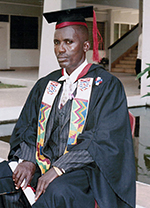In African countries, the indigenous languages have been shadowed by the English language. Even in post independent period, many African countries still use their colonizers’ languages in their official transactions and deliberations, as well as media of instruction in their schools. MA Osei Twumasi Ankrah’s research established that the use of mother tongue would be essential in the Ghanaian education.
Academic achievement is improved when students learn in their local or native languages. The language policy in Ghana stipulates that local languages be used for instructions in basic school levels up to class three.
“However, in practice this is rarely the case due to various attitudinal, structural and logistical challenges”, states Osei Twumasi Ankrah.
In his thesis Twumasi Ankrah examines the historical and philosophical underpinnings that have influenced Ghana’s language policy at the basic level of education according to the education experts’ perceptions. Based on their experiences, the second goal was to provide recommendations to improve student learning in schools. The planning and implementation of the language policy in Ghana was explored to find out the education experts’ perceptions of this policy at both the education administration, teacher training and basic education levels.
Mother tongue is essential in the initial stages
According to Twumasi Ankrah, mother tongue is essential for education, especially in the initial stages as it sets the pace for pupils to comprehend a range of concepts.
“Many of the pupils indicated that this would help them internalise the teachings. Still, the participants considered that learning of English was important to them for many reasons”, Osei Twumasi Ankrah explains.
The continued use of foreign language has been justified on reasons for connectivity with the outside world due to the desire for many African countries to be globalised. Therefore, the attitudes of both the education experts and policy makers and the citizens is biased towards English which is the former colonisers’ language in Ghana.
“The study also found out that financial constraint, lack of logistics, supervision and monitoring provided a challenge to the implementation of the language policy”, Twumasi Ankrah points out.
In his dissertation Twumasi Ankrah concludes by recommending that the Ghana Education Service and the government of Ghana should be committed to implement the policy. Furthermore, it is finally recommended that, the language policy should periodically evaluate and updated for the betterment of the learners. Doing so would contribute to a better quality of education which is the priority of any education policy and, therefore, important for national development.
Information about the Public Defence:
MA Osei Twumasi Ankrah’s doctoral thesis
Education Experts’ Persceptions of the Ghanaian Language Policy and Its Implementation will be examined at the Faculty of Education of the University of Lapland in lecture room 10, on the 26th of August 2015, at noon. Professor Johanna Lasonen from the University of Jyväskylä and the University of South Florida (USA) will be the opponent. Adj. Prof. Satu Uusiautti from the University of Lapland will be the custos. Welcome!
Information about the candidate:

Osei Twumasi Ankrah graduated as a Bachelor of Education in 1994 and as a Master of Education in 2001 from the University of Cape Coast in Ghana. He has been working in various positions as a teacher and education director in Ghana since the 1970s.
Further information:
Osei Twumasi Ankrah
tel. +358 46 567 8909
email. twumco (at) gmail.com
www.twumco.net
The press release copies of the dissertation are available at the Lapland University Press, tel. +358 40 821 4242, publications (at) ulapland.fi.
Information on the Publication:
Osei Twumasi Ankrah:
Education Experts’ Persceptions of the Ghanaian Language Policy and Its Implementation. Acta Universitatis Lapponiensis 308. ISBN 978-952-484-846-6. ISSN 0788-7604. Web version (pdf): Acta Electronica Universitatis Lapponiensis 176. ISBN (pdf) 978-952-484-847-3. ISSN (pdf) 1796-6310.
ULapland/Communications/RJ